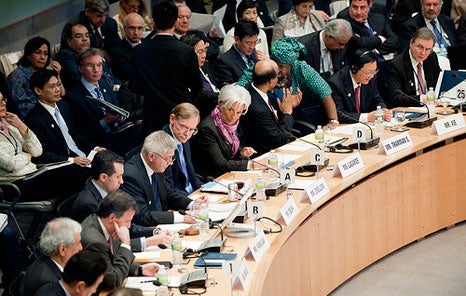
Over the past few days of the World Bank/IMF spring meetings, it’s been exciting to see just how much interest and real commitment there is among the world’s finance ministers to move toward inclusive green growth and sustainable development.
Several finance ministers at the Rio breakfast with Ban Ki-moon, Bob Zoellick, and Christine Lagarde talked about the need for better national wealth measurements that incorporate natural resources. Some were already implementing new forms of natural capital accounting. Others wanted to know more.
They were absolutely clear about two things: They want better methodology, data, and evidence to help guide them on the path to sustainable development, and they see a clear role for the World Bank as a source of that knowledge.
The difference between blind decisions and good decision-making is accurate data, and we've all seen how what gets measured is more likely to get valued – and protected.
We also talked this past week about some of the inefficiencies that can get in the way of green growth, such as fossil fuel subsidies. Despite arguments you may hear, the people who benefit most from those subsidies aren’t the world's poor, not by a long shot. If we balance the removal of fossil fuel subsidies with effective social safety nets, we can encourage cleaner energy and less waste, and actually help the people who need it most.
Water & Sanitation
We also moved the needle on providing better access to water and sanitation.
Leaders from almost 40 developing countries pledged to improve their water and sanitation over the next two years by providing better drinking water sources that will reach an additional 60 million people and improving sanitation access for 80 million more. While they were making those promises, donors stepped up with promises to significantly increase the number of people they reach.
It’s exciting to see that kind of commitment, but it’s only a start.
The simple fact is our populations and cities are growing faster than sanitation services are being provided. We still need to reach 2.5 billion people who don’t have access to a toilet and 700 million without access to clean drinking water.
The impact on lives is obvious to everyone. Less obvious is the ripple effect it has through national economies.
In Africa, 18 countries lose US$5.5 billion every year – between 1% and 2.5% of their GDP – to health costs, deaths and lost productivity linked directly to lack of clean water and sanitation. If everyone had access to sanitation and clean water, the global health sector would save an estimated US$15 billion every year.
Healthier, More Productive Oceans
Another cost to national wealth that often goes unrecognized is the damage that pollution, over-fishing, and acidification are doing to the ecosystem services and productivity we get from the world’s oceans.
Cumulatively, fisheries mismanagement has cost economies an estimated $2.2 trillion over the past 30 years. Today, 85% of our fisheries are in trouble, dead zones from fertilizer and pollution cover 95,000 square miles of ocean, and we’re putting the main food sources of 1 billion people and the livelihoods of 350 million in danger. (This infographic spells it out.)
To start addressing those problems, Bob Zoellick called together leaders from across the spectrum of ocean issues to begin developing a Global Partnership for Oceans that can help governments establish stronger oceans management.
The goal for everyone who was in that room is to return the oceans to health and productivity, and we’ll be working on recommendations and targets in the coming weeks to begin to make that happen.
Climate Change & Disaster Risk Management
Other threats aren’t as easy to see but are just as critical to address. Climate change is a big one.
In a meeting on disaster risk management and resilience, we heard a stern warning from an author of the latest report from the Intergovernmental Panel on Climate Change that extreme weather and unthinkable heat waves, the kind we wouldn’t expect to see more than once a decade, will be happening far more frequently because of climate change, almost yearly for those deadly heat waves.
To put the impact in perspective, between 1970 and 2010, disasters caused more than 3.3 million deaths and $2.3 trillion in damages. We need to prepare our infrastructure and social safety nets – while working to reduce the causes of climate change – to handle the threat getting worse.
Chris Field, the IPCC author and ecologist, stressed that climate change and disaster risk management are one and the same agenda. That conversation (you can watch the video here) led to commitments from humanitarian and development leaders in the room to work together more closely.
Social Safety Nets & Food Security
The Development Committee also added its support for the World Bank’s work on social safety nets, and it called on the Bank to continue looking for solutions to food insecurity and malnutrition, two issues our agriculture and food security teams – and really the entire Bank – are working on every day.
Our Global Agriculture and Food Security Program is one program that drew universal acclaim during a high-level meeting. GAFSP, which we established in April 2010 at the request of the G20, offers a transformational approach to aid targeted to helping countries make lasting improvements in their food security through sustainable investment in their agriculture sectors.
Lael Brainard of the U.S. Treasury had high praise for GAFSP, saying it was “setting a new standard of development effectiveness.”
That’s what we’re aiming for in everything we do, and we’re looking forward to seeing more commitments and successes in the coming weeks as we head toward the UN Conference on Sustainable Development in Rio.
Rachel Kyte
Vice President for Sustainable Development
www.worldbank.org/sustainabledevelopment
Twitter: @rkyte365


Join the Conversation